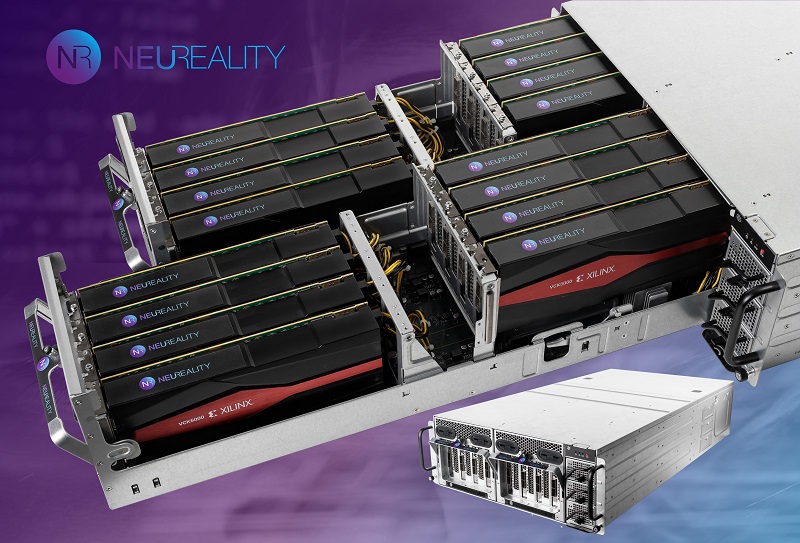NeuReality Partners with IBM Research AI Hardware Center on Next-Gen AI Inferencing Platforms

In February of 2019, IBM launched its IBM Research AI Hardware Center in Albany, N.Y., to create a global research hub to develop next-generation AI hardware with various technology partners and expand the company’s joint research efforts in nanotechnology.
Now, almost three years later, Israeli AI vendor NeuReality has joined the research center as its first start-up semiconductor partner, with the aim of helping IBM develop the next generation of high-performance AI inference platforms that can lower costs and power consumption requirements for deep learning use cases.
In an agreement announced Nov. 3, NeuReality will provide its NR1 Server-on-a-Chip ASIC product technologies, which are based on NeuReality’s first generation FPGA-based NR1-P prototype platform that was introduced in May. The NR1 SoC is an integrated circuit device with native AI-over-Fabric networking, full AI pipeline offload and hardware-based AI hypervisor capabilities that are designed to remove the system bottlenecks of existing architectures and create new ways to build enterprise hardware deployments. The core NR1-P platform is built around a 4U server chassis that includes 16 Xilinx Versal Adaptive Compute Acceleration Platform (ACAP) cards.
 Under the agreement, IBM will become a design partner of NeuReality and will work on the product requirements for the NR1 chip, system and SDK that will be implemented in the next revision of the architecture, according to the companies. The partners will also evaluate NeuReality’s products for use in IBM’s Hybrid Cloud, including AI use cases, system flows, virtualization, networking, security and more.
Under the agreement, IBM will become a design partner of NeuReality and will work on the product requirements for the NR1 chip, system and SDK that will be implemented in the next revision of the architecture, according to the companies. The partners will also evaluate NeuReality’s products for use in IBM’s Hybrid Cloud, including AI use cases, system flows, virtualization, networking, security and more.
“Teaming up with NeuReality was an easy choice for us, as they bring to the table a very disruptive and AI-focused approach that we believe will drive more streamlined and accessible AI infrastructure, and will advance industries such as finance, insurance, healthcare, manufacturing and more,” Jeff Burns, the director of the IBM Research AI Hardware Center, told EnterpriseAI. The new agreement also makes NeuReality the first start-up licensee of IBM's low-precision high performance Digital AI Cores, said Burns.
“An objective of the IBM Research AI Hardware Center is to collaborate with others in the AI community, and as such we put a focus on finding new partners to expand our ecosystem in a win-win manner,” said Burns. “We were introduced to NeuReality by a third party that was well acquainted with our work in the Center, and who felt that an IBM NeuReality collaboration would be mutually beneficial. Our third-party colleague was right, and we are excited to be working with NeuReality.”
The partnership between IBM and NeuReality will work on a wide range of use cases, including helping industries such as finance, insurance, healthcare, manufacturing and smart cities deploy computer vision, Natural Language Processing, recommendation systems and more, the companies said. The collaboration will also work to find ways to accelerate AI deployments that are already deployed in public and private cloud datacenters.
Karl Freund, the founder and principal analyst of Cambrian AI Research, told EnterpriseAI that he expects to see other companies joint the research center’s efforts in the future.
“IBM needs more companies to realize that it is investing in technology which [customers] can buy from IBM, instead of [those enterprises trying to] build [such technologies] themselves,” said Freund. Companies that think they should build their own AI systems should instead “be thinking ahead to a time soon where the technology is a commodity anyone can license,” he added. For that, IBM needs to think about technologies it can add to AI cores that will allow it to build differentiated products.
When IBM launched its IBM Research AI Hardware Center in 2019, its founding membership partners included New York state, SUNY Polytechnic Institute, Samsung, Synopsys and semiconductor equipment vendors Applied Materials and Tokyo Electron Limited.
Founded in 2019, NeuReality received $8 million in seed funding in February. Three months after emerging from stealth the company announced its plans for the NR1-P AI-centric inference platform, which the company claims will provide a 15X improvement in performance per dollar compared to the GPUs and ASICs from other deep learning chip vendors. NeuReality says the NR1-P SoC replaces what it calls the “outdated” AI system architecture from competitors.
The NR1-P platform, which is designed for use in cloud data centers and edge nodes, is being demonstrated to customers and partners and is expected to be followed by other implementations, according to the company. The new prototype platform is being used to validate the technology and is giving customers the chance to integrate it in orchestrated data centers and other facilities and see it in real-world use.
 The NR1-P is built in a 4U server chassis equipped with 16 Xilinx Versal Adaptive Compute Acceleration Platform (ACAP) cards, which are integrated, software-programmable compute platforms that the company says can provide performance beyond that of traditional FPGAs. The NR1-P SoC leverages these capabilities to implement the AI-centric compute engine while fusing unique system functions with datapath functions and the neural network processing function. These features come together to optimize critical AI-inference flows while removing system bottlenecks, according to NeuReality.
The NR1-P is built in a 4U server chassis equipped with 16 Xilinx Versal Adaptive Compute Acceleration Platform (ACAP) cards, which are integrated, software-programmable compute platforms that the company says can provide performance beyond that of traditional FPGAs. The NR1-P SoC leverages these capabilities to implement the AI-centric compute engine while fusing unique system functions with datapath functions and the neural network processing function. These features come together to optimize critical AI-inference flows while removing system bottlenecks, according to NeuReality.












